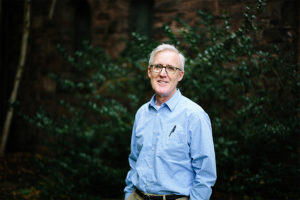Less than three weeks into a new semester, Dean of Houghton College Buffalo and History professor Cameron Airhart has announced his retirement. This decision marks an end to a forty year career, more than thirty of which have been spent as part of the Houghton faculty. Airhart came to Alleghany County in 1987, and – until two weeks ago – was one of oldest members of staff, running only a few years behind Paul Young.
Originally a Northwestern graduate, Airhart began his studies with a BA and ended with a PhD in history from University of California Santa Barbara. He is a medieval scholar with a particular interest in St. Frances, something which influenced his teaching. “There was no topic in the arena of medieval European history,” recounts Dr. Benjamin Lipscomb, a former colleague and friend, “or in a whole lot of other areas where Cameron didn’t have something informed to say.” Students agree with this assessment, citing Airhart’s incredible knowledge of the period as a great asset. “He gave me some different ideas about what the Middle Ages were actually like,” remarked Katherine Stevick ’19, who took his Western Civ. course. Stevick is now pursuing a degree in Political Science.
Airhart’s legacy, however, extends far beyond his role as a venerated professor. He was instrumental in creating Houghton Honors and Houghton College Buffalo – programs that most students now consider established and integral parts of the college’s identity. “He put together an honors track when nothing of the kind existed anywhere at any Christian college,” said Lipscomb. “The idea of bringing together a cohort of students for an intense formative experience….that was an utterly novel idea.” From this first honors ideas came others, and under Airhart’s expertise as Director of Honors – a role he filled from 1996 to 2008 – the program expanded and multiplied. According to Lipscomb, this not only enriched student experiences but enrollment, significantly bringing up percentages. “Cameron is a force,” he commented. “His energy to make connections, to set up arrangements, to think and think and think about the creative and unexpected ways and to see the thing get done is something to behold.”
 This is particularly true of the Houghton Buffalo program, which is based on helping students overcome obstacles: language constraints, citizenship issues, day jobs. Although Airhart did not found the One Symphony Campus, according to Dr. Ron Oakerson, he was integral in its current success. “The program located there evolved into one that is almost entirely dedicated to the education of refugees,” he remarked. “It is largely [due to] his [Airhart’s] vision and energy.” Before his departure, Airhart also took steps to expand the Buffalo program into other areas of the city, including a campus for ex-convicts and another for the African American community on the East side.
This is particularly true of the Houghton Buffalo program, which is based on helping students overcome obstacles: language constraints, citizenship issues, day jobs. Although Airhart did not found the One Symphony Campus, according to Dr. Ron Oakerson, he was integral in its current success. “The program located there evolved into one that is almost entirely dedicated to the education of refugees,” he remarked. “It is largely [due to] his [Airhart’s] vision and energy.” Before his departure, Airhart also took steps to expand the Buffalo program into other areas of the city, including a campus for ex-convicts and another for the African American community on the East side.
The same vision and energy that allowed Airhart to creatively approach program building also served him well as a teacher. “He was a very good storyteller,” recalls Stevick. “He made history seem alive… I really liked just listening to him lecture.” Lipscomb agreed, saying “it is possible… hard to say, and possibly alums from long ago would correct me…but he is the best pure lecturer I have ever heard.” Although Airhart had not taught a class on Houghton’s main campus for over four years – devoting his time to Buffalo instead – his legacy as a speaker remains intact.
Today Airhart is using those skills to pursue his own projects and spend more time with his children and grandchildren. His position in Buffalo has been temporarily filled by Rev. Steve Strand, who will serve as an interim dean until a permanent replacement can be hired.
